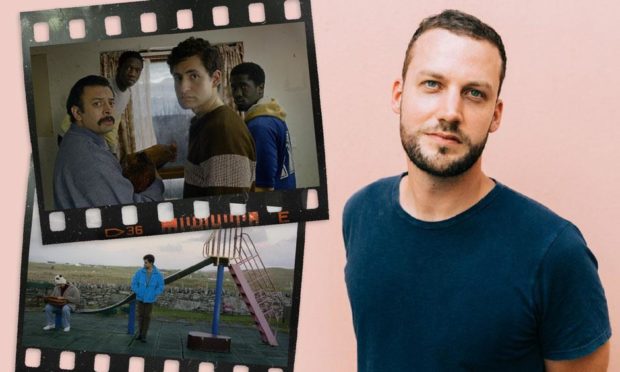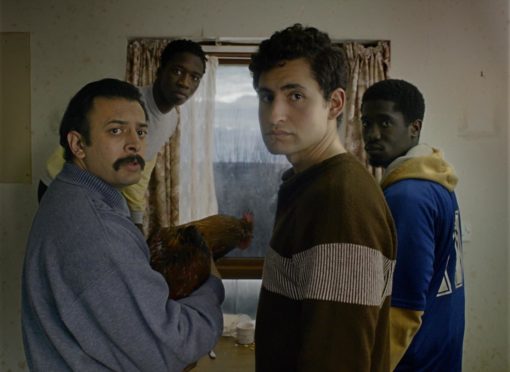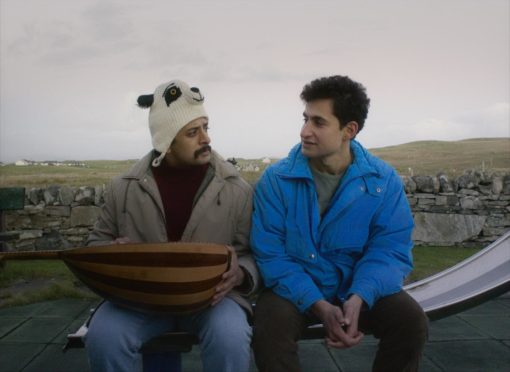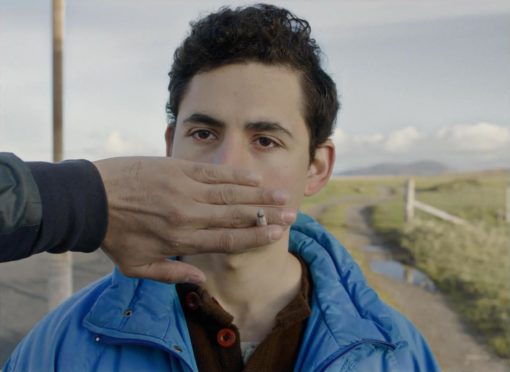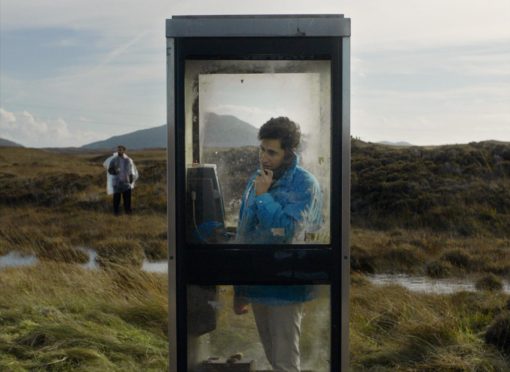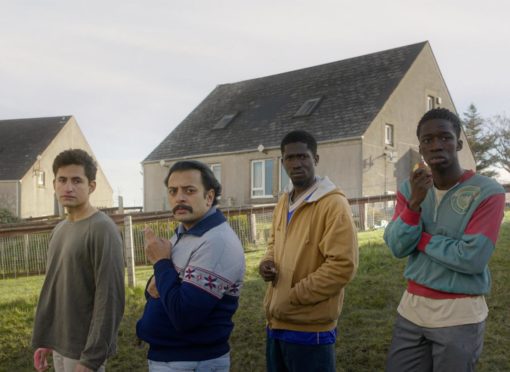For writer-director Ben Sharrock, the word “Limbo” is something of a self-fulfilling prophecy.
What began as the title of his second film, centring on a young Syrian refugee awaiting the result of his asylum claim while stuck on a remote Scottish island, has become more in tune with the current cultural zeitgeist than Ben ever could have imagined.
“I do wonder whether people are responding to the film in a different way because of the pandemic, you know?” he muses. His next words, beamed out of my laptop screen as we sit in different cities, are apt.
“The world has changed and it’s had a huge effect on everyone. That must change the way that people receive things.
“So I think it probably has had an impact on the way people are reading the film. And maybe it’s helping, in a way, to bridge the gap between the audience and the characters depicted. To have shared that experience of ‘limbo’.”
Of course, what he says is true. Now more than ever, after a series of lockdowns, hesitant governmental promises, tentative reopenings and inevitable slamming-shut-agains, the population of Scotland (and the world) is painfully aware of what in means to be “in limbo”.
So it seems impossible to imagine that the Scottish director, who won notoriety with Pikadero in 2015, was not intending to make a “lockdown film” at all.
In fact, by the time “Covid” was making its way on to TV screens, Limbo was already in post-production.
Even more impossible is the harrowing reality that the subjects of this film, refugees, have known “limbo” a lot longer than the past 18 months. And it’s their story that Ben has dedicated himself to telling.
‘I wanted to humanise the refugee experience’
In Limbo, protagonist Omar is a young Syrian refugee who, famous back home for playing the guitar-like oud, is losing his sense of self as he awaits asylum on a remote Scottish island after fleeing the civil war in his home country.
And having studied Arabic and Politics as an undergrad before going on to film school, 33-year-old Ben has carried his passion for understanding marginalised communities for more than a decade.
“I spent my third year living in Syria, in Damascus, studying at Damascus University, and this was the year before the civil war started,” he explains. “So during that time I made friends there, and experienced the culture in a very personal way.
“I went on to film school and ended up working in southern Algeria in refugee camps on a project. This project was specifically about identity and how the label of being a refugee affects identity.
“We weren’t able to make that film, because we couldn’t go back on to the island to film it – it was too dangerous.
“But this passion for the subject matter stayed with me, and the refugee crisis became more prevalent in the media.
“And it got to the point where I felt like there was this process of dehumanisation in the representation of refugees.
“I wanted to try and write a screenplay which looks at the refugee crisis in a different way and humanises the refugee experience.”
Finding the humour in tragedy
And Limbo, although definitely in the category of “art cinema”, is very much a human story.
Alongside the stoic and tender Omar (Amir El-Masry) is a meticulously drawn cast of his fellow (single, male) refugees, each with their own hopes and dreams, who take turns arguing about the romantic politics of hit sitcom Friends, waiting for post, and looking after adopted pet chicken, Freddie – named for Freddie Mercury by Omar’s friend Farhad (Vikash Bhai).
(Hilariously, Ben’s own dog Freddie, a cute miniature daschund I have the pleasure of meeting on Zoom, is named after the film’s chicken, in a chain of homage.)
Meanwhile, a slew of whimsical local characters such as quirky “Cultural Education” instructors Boris and Helga (Kenneth Collard, Sidse Babett Knudsen), a carload of gobby-but-well-meaning teens, and Still Game star Sanjeev Kohli as droll, Glaswegian shopkeeper Vikram, rounds out the island.
In short, this is a tragic story told with a light touch – and at times, a wink.
“I’m really interested in looking at big topics that are often very serious, and using humour as a way to access that,” explains Ben.
“It’s a very useful tool. I think it is sort of that ‘a spoonful of sugar helps the medicine go down’ kind of thing. And it’s a very human thing to use humour, and find humour, in moments of tragedy.”
Driech Uist is perfect backdrop
But of course, underneath the playfulness, this story is a tragedy. It is a tale of torture, of trying to fulfil laws and family obligations, of isolation and loneliness, and most of all – of not knowing when any of it will end.
This is where Ben’s directing comes in, the other half of his filmmaker’s brain.
“The script writing process and the directing very much goes hand-in-hand for me,” he says.
“So I knew I was writing a film about these characters being stuck in limbo, and using the cinematic language of that was very important.”
By “cinematic language”, for those of us less cultured, he means the visuals. And my, are these visuals (perfectly) tragic.
The first film shot entirely on Uist, Limbo makes the most of the island’s expansive landscape and bleak weather to enhance the story.
I had a quick look around on Google and just thought, ‘right ok, this is where I’m going’.”
“I was writing a film set on a remote Scottish island. And I felt like I hadn’t really been to a remote Scottish island before!” Ben laughs. “Or not the one I was imagining in my head, anyway.
“So I thought, ‘I need to go to a remote Scottish island to write the screenplay’. And I had a look on Google Maps, and I saw Uist.
“Embarrassingly, I hadn’t heard of Uist, to be honest. But I had a quick look around on Google Streetview and just thought, ‘right ok, this is where I’m going’.”
The writing process sounds gruelling in itself, with Ben cutting himself off from society to get a feel for his main character’s mindset.
“I sort of hunkered down in a remote cottage with no wifi, no signal – a peat-fired cottage,” he goes on.
“And I would write in the mornings and then in the afternoon I would drive around looking for locations. I’d try to imagine what Omar would be thinking.
“We location scouted on the mainland and on other islands that would be more accessible as well. But we couldn’t find anywhere that worked in the way Uist did – that had the same feeling.”
Red tape slows roll for refugees
Pace was another important factor for Ben when writing and shooting. Limbo is, as the name might suggest, a slow-paced film. And it brings that sense of waiting into its visuals by using what’s called a “static camera” technique – where the camera rarely moves or cuts, and instead the characters move around inside the frame.
On Uist, you could always see the horizon.”
“To have the static frames and to create that feeling of limbo in the audience, so the audience are sharing that feeling with that characters, was important,” says Ben.
“And the weather kind of ties in and speaks to Omar’s emotional state. But one thing that stuck out about Uist is that you could always see the horizon.
“So you could set up shots and find these long roads that you can just see going on forever. You don’t know where those roads go, or when they end, but you can always still see the horizon. And I felt that helped create that feeling of limbo.
“And that speaks to Omar’s journey. He doesn’t know how long he’s going to be waiting there for, or where that journey is going to lead him.”
Out of lockdown ‘Limbo’
As for his own journey, Ben is thrilled to be out of lockdown “limbo” and touring the film. After receiving his invitation to the Cannes Film Festival just after it was cancelled, the critical success of Limbo last year was bittersweet.
But now, visiting independent cinemas like Dundee’s DCA last week, Ben is in his element.
“The DCA is just such a great venue,” he beams. “And it was a really positive response from the audience there. And there’s really good food at the DCA as well, which is nice!”
Limbo will be released in cinemas on July 30 2021.
